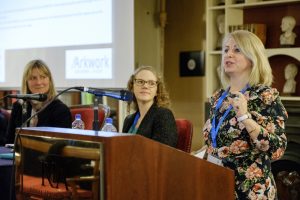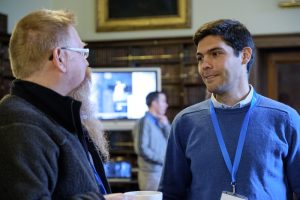
The workshop organised in Dublin gathered experts interested best practices for managing small collections of artefacts. Such artefacts may be part of a larger collection or may be too small to warrant professional tools and policies designed for larger collections, but still need care. This workshop provided attendees with information about how to gain intellectual control and provide access to these smaller collections of items, using best practices from archaeology.

Experts from across the EU presented case studies to introduce topics related to physical and intellectual access, adopting good practices, and using digitsation wisely. Participants worked on exercises, drawing on the case studies to develop best practices for their own situation as well as contribute to a website listing best practices for small artifact collections, all with the assistance of EU experts.
Invited talk
Ms. Sarah Castigan, the Deputy Director of the Little Museum of Dublin, provided the keynote at the WG2 workshop on Managing Small Collections, held in Dublin in April, 2018. She spoke of working with different community groups in developing collections.
Workshop Programme
9am-9:30am registration/coffee
9:30-10:30am Introduction
10:30-11:30 Case study 1: Physical and intellectual access of archaeological objects
Marina Toumpouri (Aristotle Univ., Cyprus) will present a case study about Ecclesiastical objects.
11:30-12:00 Coffee break
For special dietary considerations, please contact Dr. Cushing at [email protected] once registered.
12:00-1:00 Case study 2: Good practices for small archaeological collections
Eszter Istvanov and (Lorand Univ, Hungary) Valeria Kulcsar (Univ. of Pecs, Hungary) will present a case study about school collections.
1:00-2:00 Lunch
Lunch will include a selection of sandwiches, salads and sides. For special dietary considerations, please contact Dr. Cushing at [email protected] once registered.
2:00-3:00 Case study 3: Digitisation of small archaeological collections
Meliha Handzic (Burch Univ, Bosnia and Herzegovina) will present a case about using digitisation to provide access to a municipal collection of Bosnian medieval tombstones.
3:00-3:45 Coffee break
For special dietary considerations, please contact Dr. Cushing at [email protected] once registered.
3:45-5pm Development of guidelines
Gisli Palsson (The Institute of Archaeology, Iceland) and Amber Cushing (Schol of Information & Communication Studies, UCD) will act as moderators and lead a session to help participants extract useful information from the case studies for their own situation, as well as some general guidelines/take aways for managing small collections of artefacts. Additional COST members from across Europe will be available to share their expertise and assist attendees.
About the speakers
Marina Toumpouri completed her undergraduate studies in Musicology and Art History at the Universities of Lorraine and Strasbourg. She received her Ph.D. in Art history in 2010 from the University of Lille 3-Charles de Gaulle. Her research and publications deal with hagiographic iconography, the production of Western and Greek illuminated manuscripts in the Eastern Mediterranean (12th-15th century), the materiality of manuscripts and the use of new tools and methodologies for identifying the methods of work of medieval artists and craftsmen. She is currently member of the Mount Athos manuscripts’ digitization project team (Athoniki Psifiaki Kivotos) and prior she was involved in the digitization project of the Greek papyri of the National University Library of Strasbourg. She was involved in different research projects in France, Cyprus, Greece and the U.K. and previously she held a curatorial position at the department of monuments and relics of the Church of Cyprus (The Holy Bishopric of Limassol). She was the recipient of a number of research grants.
Valéria Kulcsár holds an MA in archaeology and history and a PhD in the science of history from the Hungarian Academy of Sciences. She has worked as an archaeologist at the Petőfi Museum, Aszód (Directory of Pest County Museums), and Katona József Museum, Kecskemét (Directory of Bács-Kiskun County Museums). She is currently academic staff at University of Pécs (Pécs, Hungary). Her research interests include Roman Age Barbarians and the Early Migration Period.
Eszter Istvánovits holds a PhD in archaeology from the Hungarian Academy of Sciences. She has worked as the archaeological coordinator of excavations and other capital construction works in Hungary as well as a archaeologist-museologist at the Jósa András Museum, Nyíregyháza (Directory of Szabolcs-Szatmár-Bereg County Museums). Her area of interest is Barbarians of Roman Age (Sarmatians, Germans, Dacians), Hun Age, Early Migration Period.
Meliha Handzic is Professor of Management and Information Systems at the International Burch University, Sarajevo. Her PhD is from the University of New South Wales, Sydney. Meliha’s main research interest lies in the area of knowledge management (KM), with a particular focus on the processes and socio-technological enablers of knowledge creation, sharing, retention and discovery. She has published extensively on these topics in leading journals, international conference proceedings and books. Presently, Meliha is an active member of several professional societies and groups and serves on editorial boards, executive and program committees for numerous international journals and conferences. She is also a recipient of the KM Leadership Award in 2014.
Gísli Pálsson is a landscape archaeologist who primarily works in Iceland and Sweden, affiliated with The Institute of Archaeology, Iceland and Umea University. Gisli’s main concerns in archaeology are landscape survey, archaeoinformatics, network analysis and the role of creativity in archaeological practice. His fieldwork in recent years has concentrated on Viking Age ceremonial landscapes and movement systems, both in Iceland. Gísli is currently conducting research into the role of resource claims and property ownership on agricultural land use through the project Storied lines: tracing the tendrils of agency across the Icelandic landscape (http://jardabok.com).
Amber L. Cushing is a Lecturer/Assistant Professor at the School of Information and Communication Studies, University College Dublin in Ireland where she also serves as Director of the Msc in Digital Curaiton Programme and Director of the PhD in Information and Communication Studies Programme. She previously served as Director of the Allenstown, NH Public Library while managing her consulting business, Cushing Information Consulting. She has taught graduate courses in Digital Curation, Research Methods, Information Resources and Services, Archival Access and Technology Issues and Archival Outreach. Cushing holds a PhD in Information and Library Science from the University of North Carolina at Chapel Hill, an MLIS with a concentration in Archives Management from Simmons Graduate School of Library and Information Science, and a BA in History from Mount Holyoke College. Her main area of study concerns how individual perceptions of value in digital collections can influence institutional practices in LAMs.
Materials
- http://www.vhnireland.org/past-conferences/conference-2018-2/pre-conference-workshop-2018//
- Highlights from the workshop on video (until 0:24) at https://www.youtube.com/watch?v=hIT3ANiHPQ8
